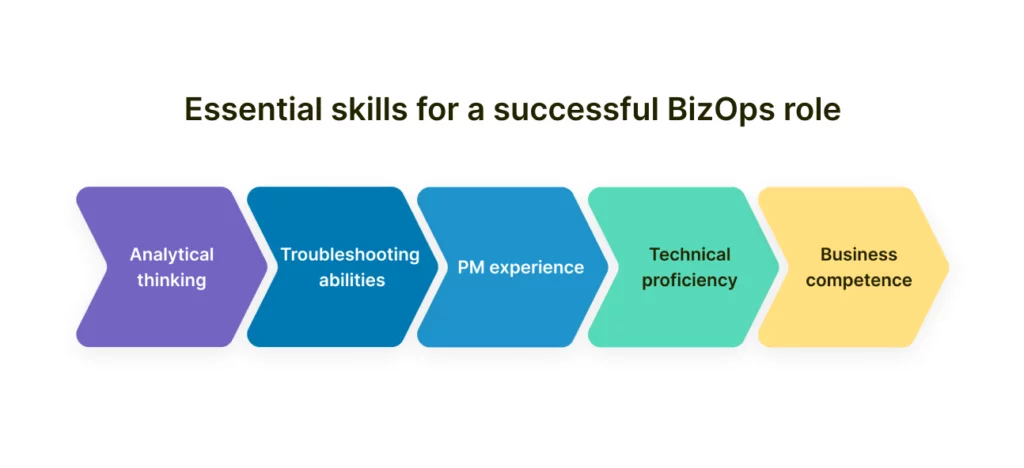BizOps is an emerging career path that is especially popular among tech scale-ups. But what does it actually mean, and what does this position do? Continue reading to find out more about this new role and the conclusions we reached after looking at over 50 BizOps role descriptions and requirements.Most people will give you similar answers when asked what a product manager or sales representative does. The same scenario occurs when it comes to strategic roles. People frequently ask what business operations (BizOps) is and what the responsibilities of this role are.To point out the similarities and differences with other senior leadership positions, we looked at over 50 job descriptions for open roles with “BizOps” in the job title across both early-stage startups and tech giants.
The open roles ranged from “Head of BizOps” and “Senior Analyst, Product & Engineering BizOps” to “Senior Finance & BizOps Analyst.” While the job titles did not make it easier to understand, some common threads were found.
What is BizOps?
While an internal strategy role may be more familiar among companies, BizOps, or business operations, is a new corporate development role that is becoming key across organizations. These business professionals can access the data from all business units, assisting with planning and identifying any strategy ops gaps.
The core responsibilities of the business operations team revolve around helping senior leadership and business owners make important decisions by providing data-driven insights to continuously improve the company’s performance and achieve business goals.
What skills are necessary for BizOps?
BizOps, or Business Operations, is a relatively new field of expertise that combines the skills of business and IT professionals to create an efficient and effective operational environment.

These unique set of skills include analytical thinking, problem-solving capabilities, project management experience, technical knowledge, and an understanding of business processes. Moreover, it is also a must to have strong collaboration skills and maintain active communication with all departments and business stakeholders.
What is internal strategy?
On the other hand, when it comes to internal strategy, many find it hard to give a precise definition. This is because this position varies in responsibility and duties from company to company. The team of professionals in charge of the internal strategy focuses on providing strategic support to improve the overall business strategy.
This position also takes an all-encompassing approach when it comes to strategic decision-making and ensures that all teams across an organization are aligned on future company objectives.
What is the difference between BizOps and internal strategy?
Strategic decision-making is at the heart of business growth. But who is in charge of designing a roadmap for specific business outcomes? Often, this duty falls on the internal strategist or analyst. However, in recent years, a new job role has gained popularity as its sole purpose is to help the company make more informed decisions, collaborate among cross-functional teams, and ultimately achieve operational excellence. This buzzing job position is called “business operations.”
If you want to scale your company and improve your overall business processes, you must ensure that you have the right team of ambitious professionals analyzing data and gaining actionable insights from their data. This is one of the core responsibilities of this all-encompassing role.
Thus, the difference between BizOps and internal strategy lies in the fact that BizOps focuses on the analysis and implementation of processes and systems to ensure that an organization’s goals are met in an efficient manner. This includes developing operational plans for how to best use resources, such as personnel, technology, and capital, to achieve desired outcomes.
Whereas internal strategy focuses on the development of a company’s long-term vision and goals. This includes the development of strategies for how to best position the organization in the market, how to best use resources, and how to create competitive advantages.
Read on to discover more about some of the commonalities and contrasts in key business areas between the roles of internal strategy and business operations.
Cross-functional management
Previously, 84% of the business strategy roles in tech were a mix of strategy, operations, and finance.
Today, while the internal strategy consultant takes care of the overall strategy, the BizOps professional is the one acting as a business partner across different key functional areas of an organization, aligning strategy and operations, and asking and answering the tough questions such as which country to enter next and how, which segment to target next, or which product feature to prioritize.
Data-driven mindset
Since the job descriptions for BizOps and internal strategy sometimes call for the same function-related skills, many business leaders onboard one or the other role interchangeably when a data-driven approach is necessary.
100% of the job descriptions mentioned setting and measuring metrics (OKRs & KPIs).
58% of senior roles included initiatives to “centralize data” or “standardize and distribute metrics.”
92% of junior roles specifically stated SQL or data querying. They also preferred experiences in advanced modeling, data analytics, and visualization tools.
Banking, consulting, or operations experience
98% of the roles analyzed required work experience in banking or consulting. The requirements section included phrases like “a minimum of X years of relevant experience in the field of Finance or consulting”, or “a great opportunity for those with experience in consulting, banking, private equity, corporate strategy, or similar roles.”
So… what do you think? Is internal strategy sufficiently separate from the role of business operations? Or will it take further evolution to make a clear distinction between them?
However, regardless of whether you are a business operations manager or an internal strategist, you will need to put in place a financial and operational system with which to measure metrics to make strategic decisions faster.
Modern xP&A (collaborative planning & analysis) solutions drive this agility and can provide you with additional time to gather strategic insights for business growth.
Streamline your data reporting & forecasting with business operations technology
As a BizOps professional, it is your responsibility to be able to identify operational gaps, learn from business analytics, and use this information to drive strategic decision-making across all departments.
Already looking to modernize your financial planning and forecasting processes? If you are searching for BizOps software to help you streamline your data and gain actionable insights, Abacum is here to help.
Abacum is the FP&A software that empowers business strategy roles in tech of high-growth companies to become true strategic partners in their organization.









